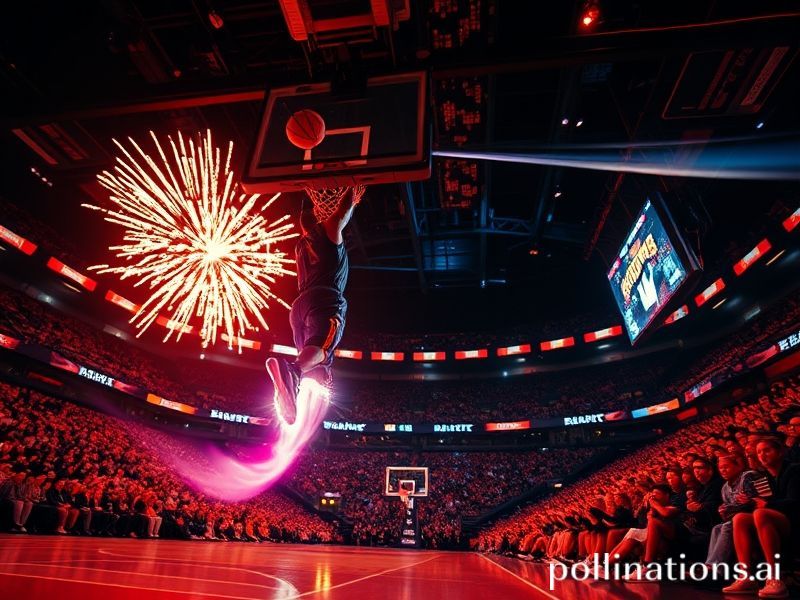Global Hoops: How Slam Dunk 2026 Unites a Fractured World Through Manufactured Drama and Overpriced Nachos
**Dunking on the Apocalypse: How the World Plans to Celebrate Sports While Everything Burns**
The year is 2026, and humanity has collectively decided that what we really need right now—amid the cascading climate disasters, democratic backsliding, and the fact that your smart fridge is probably spying on you—is another international sporting spectacle. Enter “Slam Dunk 2026,” the FIBA Basketball World Cup’s flashier cousin, set to transform basketball courts across four Asian nations into temporary temples of hope, nationalism, and overpriced merchandise.
From Tokyo’s neon-lit arenas to Manila’s traffic-choked streets, the tournament represents something profoundly human: our species’ touching ability to organize elaborate athletic competitions while the world economy performs its best impression of a Jenga tower in a hurricane. The Philippines, Japan, Indonesia, and co-host Qatar—because nothing says “basketball tradition” like a desert nation where outdoor courts double as frying pans—are spending billions they definitely have lying around on infrastructure that will serve as monuments to fiscal responsibility for decades to come.
The international implications are staggering. China, still smarting from its basketball humiliation at the 2023 World Cup, views 2026 as its opportunity to prove that state-sponsored athletic programs can buy happiness—or at least medals. The United States, meanwhile, sends NBA stars who earn more per game than most host cities spend on education annually, creating a beautiful metaphor for global inequality that everyone politely ignores while chanting “USA! USA!”
European nations approach the tournament with their characteristic optimism, which is to say they’re already preparing elaborate excuses about why losing to countries with functioning basketball programs doesn’t count. France plans to blame their inevitable quarterfinal exit on jet lag, while Spain will attribute any victory to their superior tactical understanding of a game Americans play while chewing gum.
The broader significance extends beyond sport into the realm of international diplomacy—or what passes for it when world leaders would rather discuss three-point percentages than nuclear proliferation. The tournament serves as a rare platform where nations can compete without actual bloodshed, though the violence in fan sections might qualify as minor skirmishes under certain UN definitions.
For developing nations, the event represents a curious form of soft power: the ability to host thousands of visiting journalists who will definitely focus on your basketball facilities rather than your human rights record. Nothing distracts from domestic issues quite like organizing a successful international tournament, as proven by every host nation since the Romans realized bread and circuses were cheaper than actual governance.
The environmental impact deserves mention, if only for the tragic comedy of flying athletes, media, and fans across the globe to watch people throw balls through hoops while we collectively pretend this isn’t accelerating our appointment with climate catastrophe. The tournament’s carbon footprint will be offset by planting trees that definitely won’t burn in next year’s record-breaking wildfire season.
Technology promises to revolutionize the viewing experience through virtual reality, allowing fans worldwide to feel like they’re courtside without the inconvenience of actually traveling to witness humanity’s peculiar habit of turning physical excellence into corporate entertainment. AI-powered analytics will provide insights that nobody asked for, while blockchain technology will somehow be involved—because it always is, despite nobody understanding why.
As we hurtle toward 2026, Slam Dunk serves as yet another reminder that civilization’s greatest achievement might be its ability to maintain elaborate sporting traditions while everything else crumbles. It’s almost touching, really—like arranging deck chairs on the Titanic, except the band is playing hip-hop and the deck chairs cost $400 each.
In the end, perhaps that’s the real victory: finding meaning in the meaningless, unity in competition, and hope in the knowledge that no matter how bad things get, we can still agree that watching extraordinarily tall humans put orange balls through metal rings beats thinking about the alternative.







